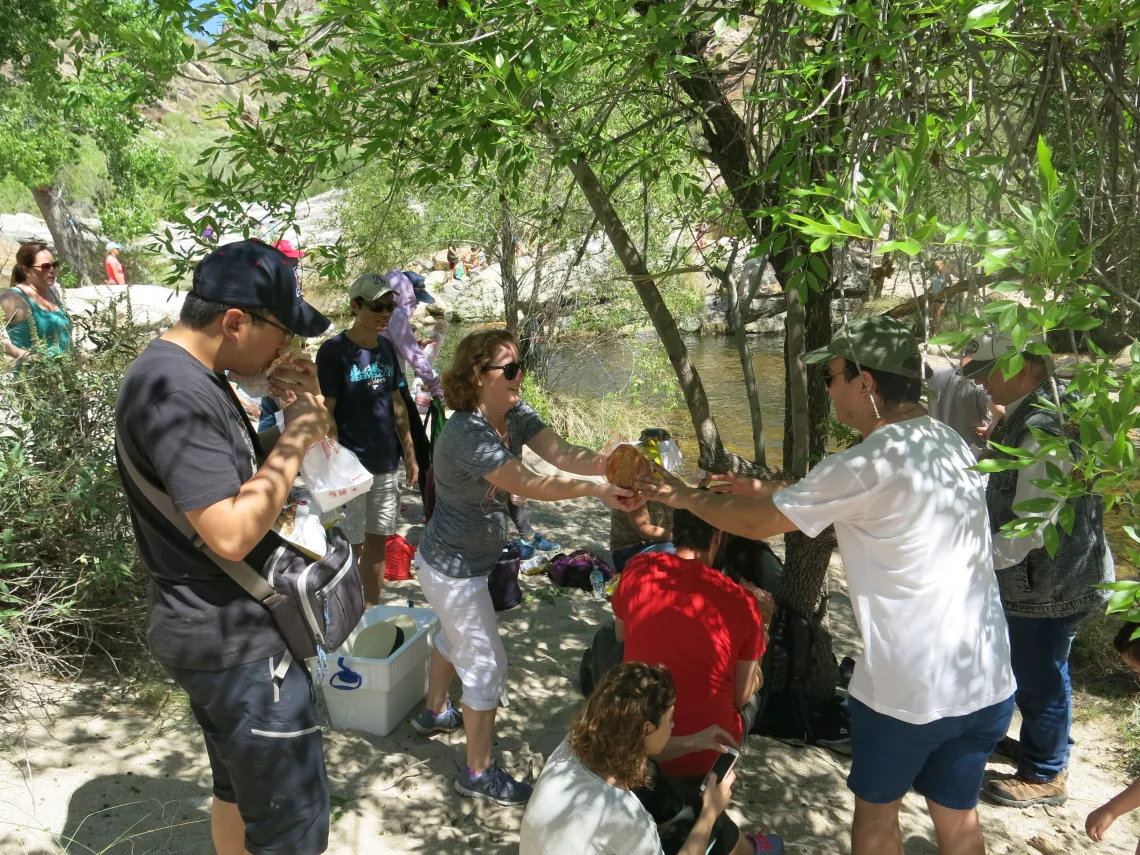UA International Faculty and Scholars Experience the Real Arizona

Winding through the Santa Catalina Mountains on a cloudless day, University of Arizona (UA) visiting faculty and scholars from around the world encountered the real, wild Arizona. Organized by the International Faculty and Scholars Office (IFS) within the Office of Global Initiatives (OGI), the trip exposed participants to the desert in its most natural form.
Aside from assisting international faculty and scholars with immigration services and permanent residency applications, IFS hosts regular events to promote cultural exchange. Trips to sporting events and academic discussions are commonplace, but this spring the organizing committee decided to host an event showcasing desert wildlife with a picnic and tour of the Sabino Canyon Recreation Area.
“A lot of the events IFS focuses on are sports-related and academic-focused, so we thought this time it would be fun to do something to allow visiting faculty and scholars to appreciate the outdoors,” said Melanie Marsh, an Immigration Document Processor with IFS. “The events we organize introduce people to the surrounding region, and it doesn’t get much better than this!”
Fewer than 13 miles from the UA Campus, Sabino Canyon sits within the Coronado National Forest, a diverse ecosystem with abundant plant-life, including towering saguaro cacti and green-barked palo verde trees. Because of numerous visitors, animal sightings are uncommon, but visiting faculty and scholars looked for a rare glimpse of mountain lions, bobcats, or even tarantulas roaming the desert.
Monica Costa, a native of Portugal researching molecular biology, noted how vastly different the landscape was from her home country. “I live in a northern coastal city with a lot of rain. Everything is cramped there— the streets, the buildings. Here in Tucson, everything is spread out, which is really nice,” she said. Costa is doing research for her master’s thesis and hopes her experience at the UA helps her attain a job as a lab technician.
For many of the visiting faculty and scholars, this was their first time at Sabino Canyon, long considered Tucson’s desert oasis. The group took the tram to the top, smiling and snapping photos along the way before stopping to relax and eat alongside a creek.
Katrin Shamshiri of Iran is a technical expert in critical languages and Farsi instructor at the UA. Having lived in Tucson for more than a year, she had advice for her fellow faculty members and scholars. “I love Tucson, and I would highly recommend coming to the UA to friends and colleagues. I would just tell them to remember lots of sunscreen!”
Carolina Armenta, a post-doctoral researcher from Mexico, agreed with Shamshiri. She added: “I’ve had a good experience at the UA. There are a lot of good activities, and I like being part of the post-doc group. My goal is to be a professor of psychology, and the people at IFS have been great in helping me work toward my goal.”
Magdalena Lewandowska, a visiting scholar from Poland, found herself half way across the world to research Native American archeology, specifically Pueblo culture. “We had a scholar in Poland working on Native American archeology, and that is what sparked my interest. I really like being based at the UA. The library is fantastic; I can find anything there!” she said.
In between photos and laughs, the group exchanged ideas about their countries and cultures, many times realizing they were more connected than they realized. These are the kinds of connections that IFS, which supported 1,700 visiting faculty and scholars last year alone, prides itself in forming.
“It’s all about cultural engagement. It’s important to show our visiting faculty and scholars a good time— what it’s like to experience America beyond campus. I encourage people to do all sorts of things, to make American and international friends, and to network as much as possible,” said Jack Sterbis, Assistant Director of IFS.
For more information about IFS and its programs, please visit https://international.arizona.edu/ifs.

